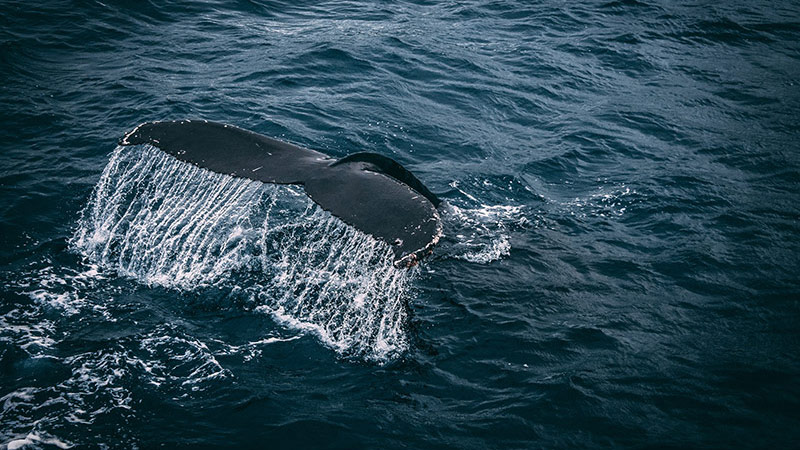Canadian foundation supports digital innovation that aids right whale conservation
Author: Eric Marks
Posted on Dec 11, 2023
Category: Research , UNB Fredericton , UNB Saint John

Thanks to the Murphy Family Foundation, the University of New Brunswick’s (UNB) McKenna Institute and intrepid researcher Dr. Kim Davies, one of our region’s most iconic and endangered species, the North Atlantic right whale, is getting a better chance at survival.
“When people think about the digital transformation of New Brunswick, wildlife conservation isn’t the first thing that comes to mind,” said McKenna Institute founder Frank McKenna. “Whether you’re talking about Atlantic salmon or whales, achieving a sustainable population depends upon knowing where endangered species are and reducing threats to their survival without significantly disrupting economic activity. Digital technology can do that by using real-time remote monitoring and fast data analysis to better manage human-wildlife interaction.”
“This is a research area where UNB is leading the way, and the McKenna Institute is happy to help build upon the impact that researchers like Kim Davies have been able to achieve using innovative digital technology.”
Davies is an associate professor at UNB’s Saint John campus, where she heads the Davies Lab in Conservation Oceanography and Marine Technology. She sees the endangered right whale as a model organism for researching marine hotspots where at-risk species must co-exist with human activity.
Through a collaborative project with Transport Canada, the Ocean Tracking Network and the Woods Hole Oceanographic Institution, she is pioneering the use of a new oceanographic technology, the underwater acoustic glider, for monitoring whales in shipping lanes and in fishing areas where they are at high risk of mortality.
“The gliders surveil shipping lanes for months at a time listening continuously and reporting the whale detection data to a shore station via satellite every four hours,” said Davies. “An analyst on shore validates the detections and then if right whales are detected, Transport Canada is notified and puts into place a speed restriction zone around the detections.”
Having proven that the technology works to help conservation management, the Davies Lab needed partners to expand its research. Enter the McKenna Institute and Glenn and Stacey Murphy and their children, Brendan and Shannon, who created the Murphy Family Foundation in 2007 to support worthy causes that improve quality of life for Canadians and people worldwide.
“We believe that protecting our oceans is one of the most significant conservation opportunities of our lifetime,” said Shannon Murphy, director of the Murphy Family Foundation. “When Frank McKenna came to us with a proposal to help advance Kim’s research into ways of protecting right whales in active shipping lanes using digital technology, we wanted to see the data. We’re happy to invest in her work because it is getting results.”
The Murphy Family Foundation’s gift of $300,000 in support of the McKenna Institute will be used to create the Murphy Family Postdoctoral Fellow in Ocean Conservation at the Davies Lab, including funding support for travel, outreach and professional development. This new fellowship will enable Davies to build out the impact of her glider research partnership with Transport Canada, which has grown each year since 2020.
The support is much appreciated.
“We’re making an impact on ocean conservation and sustainable development too,” said Davies. “Industries are relying on sustainably using our oceans, so we’re working not only to try and save the species but also to facilitate sustainable development of our ocean industries.”
The right whale population appears to be stabilizing after a 10-year decline, thanks in part to the new measures adopted by Transport Canada and Fisheries and Oceans Canada with the help of research partners like the Davies Lab.
“If we can improve survival rates as a result of Kim’s work, these whales might have a chance of recovery,” said Murphy. “Impact starts by believing in a better future. Giving gets us closer to that reality.”
If you would like to support whale conservation and the McKenna Institute, please contact Craig Poole at cpoole@unb.ca or 506-452-6045.
